A main achievement of Israeli Apartheid over the years was the division of the Palestinian people. While Jews (and other colonialist settlers of all creeds) may roam freely from the river to the sea and enjoy the whole spectrum of privileges, from free speech to the “right” to expropriate Palestinian land, the native Arab Palestinians are confined to enclaves and divided by different systems of discrimination and oppression, different leaderships and different (illusory) political perspectives.
The semblance of democracy in ‘48 Palestine was a strong weapon in Israel’s propaganda war to claim itself as “basically a democracy,” disturbed only by “temporary occupation” (already 56 years old) of the West Bank and Gaza. The reality for Palestinians in the -48 occupied areas was never democratic: major political parties (al-Ard in the fifties and sixties and the Islamic Movement in the previous decade) were disbanded, and their leaders and activists were persecuted. Systematic ethnic cleansing, home demolition, and land confiscation continued uninterrupted throughout the state of Israel’s 75 years. The participation of some Arab parties in the Zionist Knesset was used internally to constantly incite racist public opinion against them while marketed internationally as proof of Israel’s “lively” democracy.
We always have to estimate what degree of political activity in ’48 will put us behind bars, and we are used to speaking up to the “democratic margins” of what is tolerated by the regime. The width of those margins has changed over the years. From 1948 until 1966, Palestinians under Israeli rule were subject to a military regime that was stricter than what was later imposed in the West Bank: you had to ask for special permission from the military governor even to visit your relatives in the next village. Later, when Israel felt it had become a world-class empire, and when Israeli society became more capitalist and more individualistic, these margins expanded gradually, but never to the level that allowed the Palestinians, who are formal citizens of Israel, any real influence over their, or the country’s, fate.
As that empire began dismantling, when Israel was forced to withdraw from Lebanon (in 2000) and Gaza (in 2005), Israeli society began abandoning its liberal pretensions for the sake of messianic religious nationalism, and the margins of democracy sharply narrowed. Since October 7, the state’s self-confidence has collapsed following the attacks by Hamas, and the oppressive apparatus and Zionist public have turned hysterically against Palestinians everywhere, crushing any democratic margins altogether.
The repression deepens
I already reported here in detail about the repression of the first attempts to protest against Israel’s massacres in Gaza and to demand an end to the bloody war. In this second post about Israel’s full-scale dictatorship, I will describe how repression is deepening as the new rules of the game become clear.
Start with Haifa. In the previous post, I described how, on October 18, police prevented a Gaza-Solidarity demonstration by Herak Haifa even before it started. Six of us were arrested but, as we did not have the time to do anything at the demonstration, were released the next day.
On the morning of October 29, the Haifa police did not wait for another demonstration and invaded my house in a big show of force. They confiscated Palestinian flags, posters, and banners from old demonstrations. They arrested me for the night. The next day, they requested to extend my detention on the grounds that by having flags and banners at home, I performed the crime of “behavior that might disturb public order” (this was the article of the law they used). They explained that I might take part in some future demonstrations. Due to my poor health, I was detained mostly in a hospital, where I was handcuffed to a bed and guarded by two armed policemen. The police also sent to the Israeli press some photos of the mess they made in my house and a photo of me in custody, boasting that they detained “a Hamas supporter.”
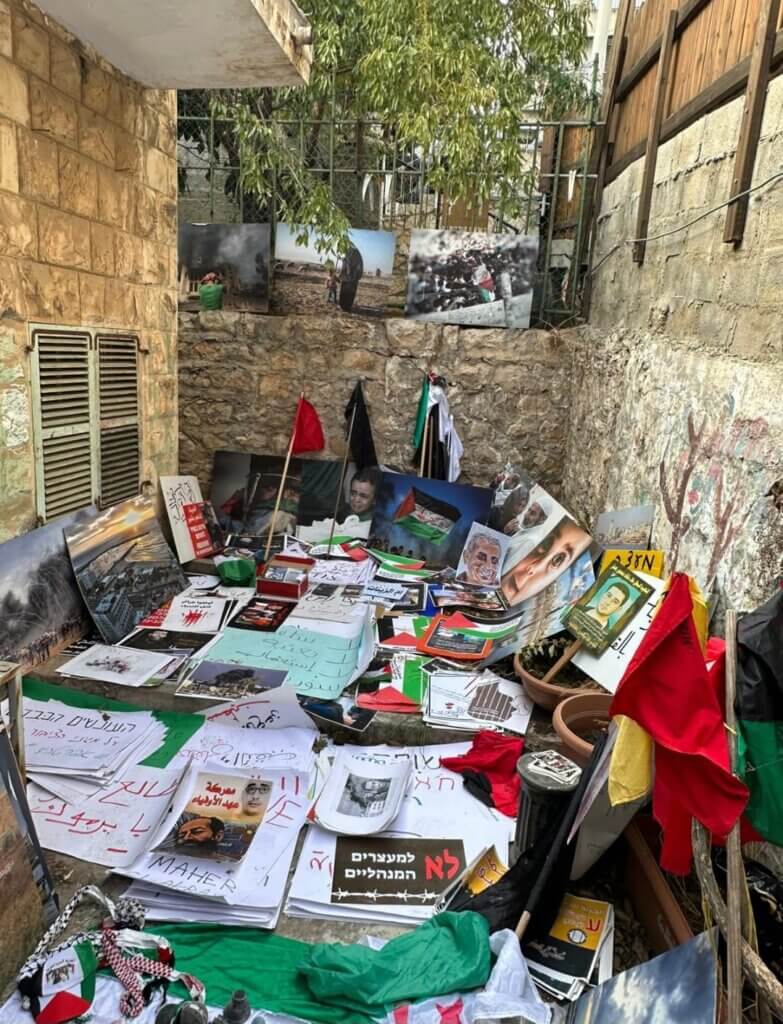
I was duly released on the second day, because, once again, I was arrested for doing nothing. In response to my release, Israel’s minister of “national security,” who oversees the police, the notorious extremist Itamar Ben-Gvir, also posted my picture on social media describing me as a “Hamas supporter,” but the main subject of his attack was the judge that ordered my release. As the judge happened to be Arab, Ben-Gvir labeled him “the enemy within.”
In my previous post, I also reported a peaceful “stop the war” demonstration that succeeded in marching in the streets of Umm al-Fahm on October 19. As it was dispersing, it was violently attacked by the police, and 12 of the demonstrators were arrested. After a few days, most of the detainees were released on bail, but the police concentrated on two activists whom it regarded as the organizers, and indicted them of “supporting terrorism.” The two are lawyer Ahmad Khalifa and educator Muhammad Taher Jabarin.
The demonstrators in Umm al-Fahm were very careful not to use any slogans that might be considered illegal. Yet, every single slogan that they used was distorted in a way that misconstrued the actual meaning. One of the most common slogans in Palestinian demonstrations is, “Oh masses, join, join, our people are sacrificing their blood.” The Palestinian blood refers to the victims in Gaza, most of whom are civilians and many of them children. The slogan is meant as a call to action to the people around you to join the demonstration in solidarity. According to the prosecution, the people sacrificing their blood are only Hamas fighters, and thus, the slogan is calling on people to join them in the fight!
The police requested the court to remand the detention of Khalifa and Jabarin until the end of the trial, which might take many months or even more than a year. The two are still held in harsh conditions, with hundreds of other new political detainees in the “security prison” in Megiddo, prevented from essentials like changing clothes, soap, electricity, or a toothbrush. The next remand hearing was set for November 13.
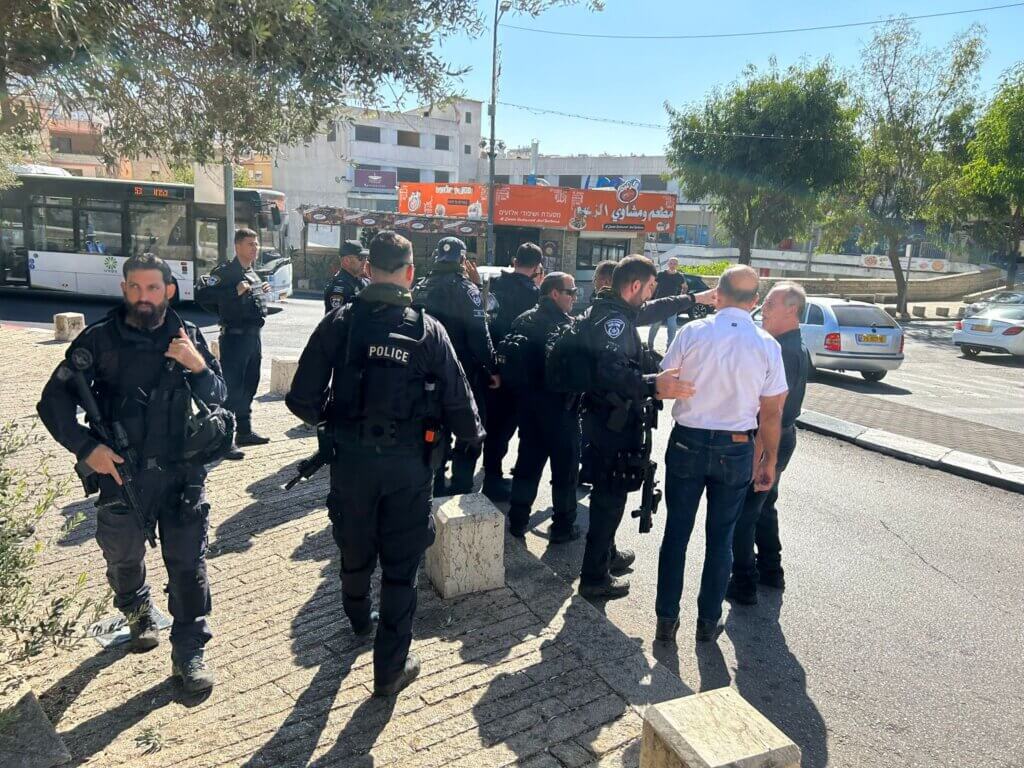
More attempts to protest
I also reported how the police prevented an Arab-Jewish gathering against the war in a closed hall in Haifa, by threatening the owner of the hall. The gathering was due to take place on October 26 and was called for by the High Follow Up Committee, which is the united leadership of ’48 Palestinians. On the same day, the committee called for a press conference in its Nazareth offices instead. Muhammad Barakeh, the committee’s head, promised that the voice of the Palestinian public (in 48) against the war would not be silenced. When asked what would be their next steps, he replied, “We would ask for a license for a demonstration.”
Finally, it was Hadash, the Arab-Jewish front organized around the Israeli Communist Party, that requested licenses to hold two demonstrations against the war on Tuesday, November 7, in Umm al-Fahm (in the Triangle) and in Sakhnin (in the Galilee). The police refused both requests. Hadash, together with Adalah (the legal center for Arab minority rights in Israel), appealed to Israel’s Bagatz (Hebrew acronym for “High Court of Justice”), claiming that the police are preventing any form of protest by Arab citizens at the time of the war. They cited the chief of the Israeli police, Shabtai, who declared that there would be zero tolerance for anyone who wanted to show solidarity with Gaza and promised to put protesters on buses and drive them to Gaza.
The three Bagatz judges tried to distance themselves from the provocative declarations of the police chief but rejected the appeal on the grounds that the police did not have enough forces to keep order in the planned demonstrations. They ignored the fact, proved by countless previous protests, that in any Palestinian demonstration in Palestinian towns, the best way to prevent disorder is for the police to stay away. In fact, what the police claimed was that they did not have enough forces to attack and oppress the demonstrators, as they did in Umm al-Fahm on October 19.
As the last fig-leaf, the judges emphasized the police promise to consider any new request for protest according to the circumstances, and not to apply a total ban on protest.
The court decision was given on Wednesday, November 8, and was tested the next day. The High Follow Up Committee informed the Nazareth police that they plan to hold a small anti-war vigil, that was not publicly announced, in the center of the city on Thursday morning. They promised that there would be very limited attendance, less than 50 people, and reminded the police that such a vigil does not require any license. They said they only informed the police in advance to prevent any misunderstanding.
On Thursday morning, November 9, the police laid a checkpoint on the entrance to Nazareth and detained Mr. Barakeh, before he could even get anywhere close to the site of the vigil. Five more prominent Palestinian leaders were detained in “the spring square,” in the middle of Nazareth, even before the vigil could start. Four of the detainees, including Mr. Barakeh, Haneen Zoabi, and the head of The National Democratic Alliance, Sami Abu Shehadeh, were former members of the Israeli Knesset. When they argued with the police about the prevention of their minor quiet protest, they learned how the police interpreted the court decision: you do not have the right to demonstrate against the war.
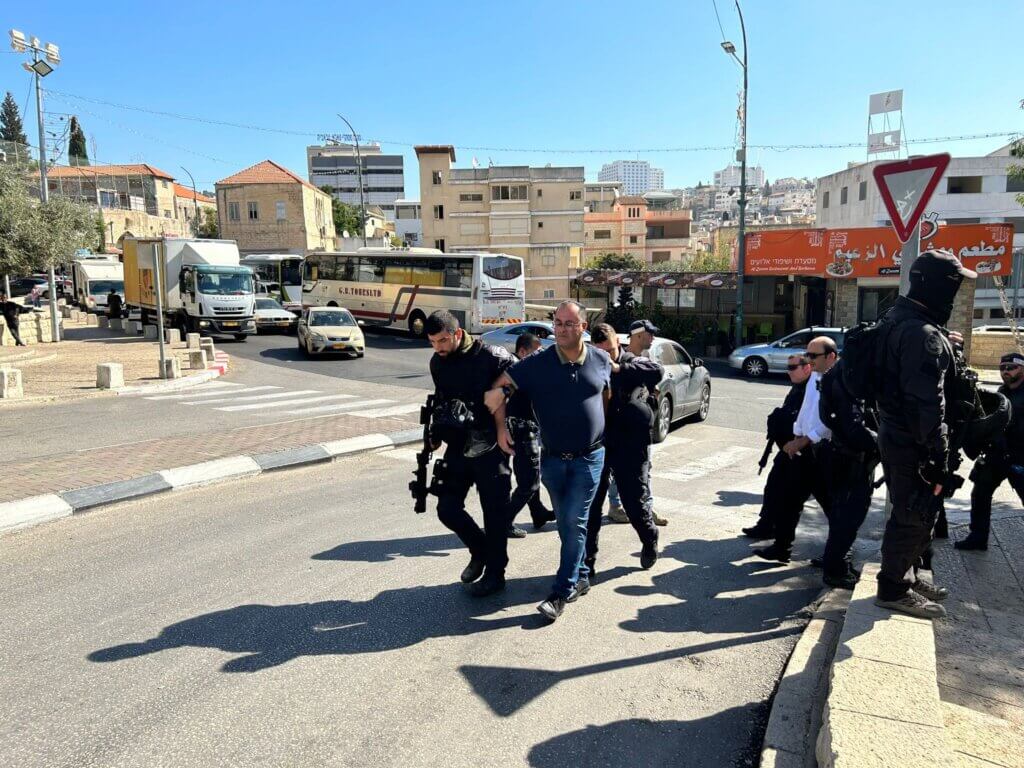
Silencing a protest against the silencing of protest
The news of the “preventive detention” of the leadership of the Arab public was received as a shock in what remained of the small democratic sphere in Israeli society. They could easily ignore the suppression of the “radicals” in Herak Haifa and Umm al-Fahm, but the detention of the leaders of the Follow-Up Committee was sharp evidence that the extreme right-wing Ben-Gvir is not only the nominal figure at the head of the police but is also setting the tone and giving the orders. The “high court,” which many liberal Israelis hoped could limit the fascist wave, proved (again) useless.
Demonstrating against the war in the current mood in Israel is apparently too dangerous. So, some activists had the idea that it might be possible to demonstrate against the curtailing of the basic democratic right to protest instead. There was a quick call, spreading in WhatsApp groups, to hold vigils to protest silencing on the same day, November 9, at 17:00, in front of the police headquarters in Tel Aviv and Jerusalem.
I attended the protest in Tel Aviv. When I arrived, there were only some 20 people that were preparing to protest. The police were setting iron railings around us, so we thought they might allow the vigil to take place. But within minutes, a big police force arrived, and their commander declared that “there would be no protest, no megaphones, no banners.” Without caring for the regular declaration of illegal gatherings and without demanding that the protesters disperse, he ordered his men to attack, and they started to tear banners and drag with them the more vocal protesters.
I was standing in the back with Jonathan Pollak, a well-known activist from Jaffa. A special police group came and arrested him while he was standing quietly at my side, just because they recognized him.
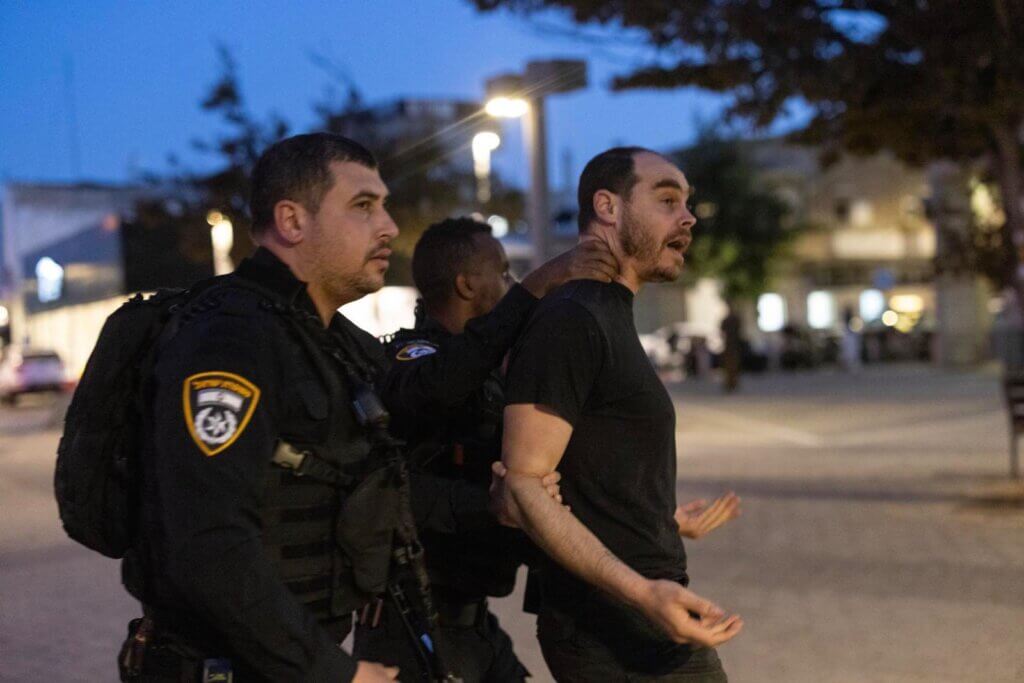
Meanwhile, the crowd was growing, and there were already around a hundred of us, but we were pushed away from the police headquarters and into a side street. Some of us tried to shout “Jews and Arabs, refuse to be dumb,” “Police State,” or “No to political police, no to a fascist state!” Every time we raised our voice, the police attacked violently again, dragging with them more detainees, and pushing us farther down the street. All in all, 18 protesters were detained in the Tel Aviv demonstration.
Siha Mekomit (“Local Call”) reported about the Jerusalem demonstration:
About twenty demonstrators gathered for a protest vigil in the Russian Compound, with sticky paper on their faces in protest of the gagging. In less than three minutes, police officers from the station came out and announced that it was an illegal gathering. The police pulled out batons, started beating the protesters, and chased them in the streets of Jerusalem for over half an hour.
One of the protesters was severely beaten and arrested as he needed medical treatment. Four other protesters sought medical treatment, after receiving severe blows from batons in their heads, ribs and limbs. During all this time, there were no calls, banners or megaphones.
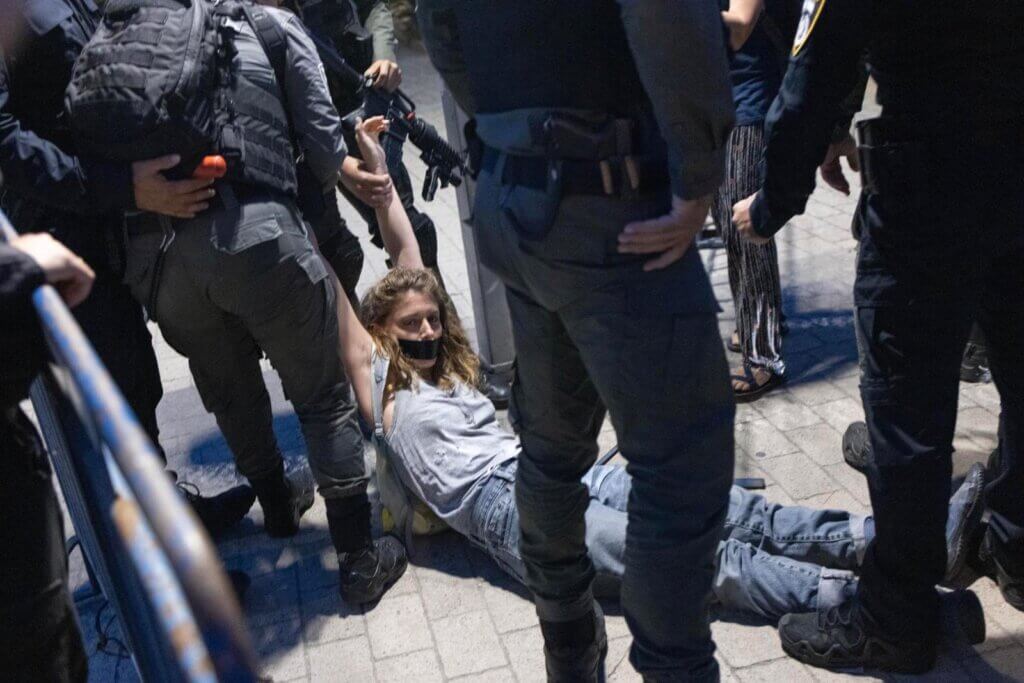
Well, you should not be too concerned about the freedom of expression in Israel. On the very same day, there was a right-wing demonstration in Tel Aviv in support of the occupation of Gaza. It was licensed by the police, and there were no detentions.
As far as I know, all the detainees from Nazareth, Tel Aviv, and Jerusalem, were released on the same day.
A secret demonstration

The tireless Follow Up Committee proved that it would not be silenced. Today, Saturday, November 11, they held a meeting in the town of Ar’ara in the Triangle. This time they did not tell anybody in advance, especially not the police. At the end of the meeting, they went out to the nearby street and held banners calling for the end of the war.
Although the police were not there to guard the public order, the event finished without any noticeable disturbances.
At Mondoweiss, we understand the power of telling Palestinian stories. For 17 years, we have pushed back when the mainstream media published lies or echoed politicians’ hateful rhetoric. Now, Palestinian voices are more important than ever.
Our traffic has increased ten times since October 7, and we need your help to cover our increased expenses.
 RSS Feed
RSS Feed













 November 12th, 2023
November 12th, 2023  Awake Goy
Awake Goy 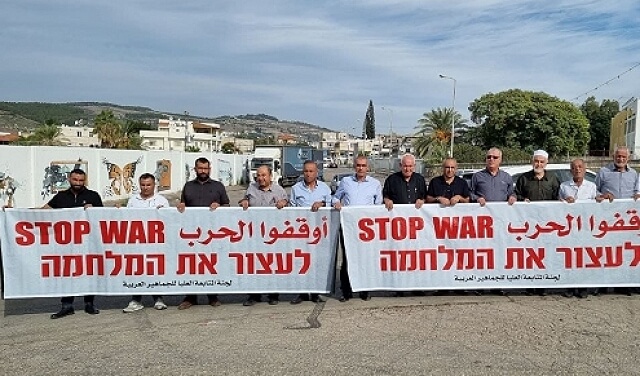
 Posted in
Posted in  Tags:
Tags: 
















